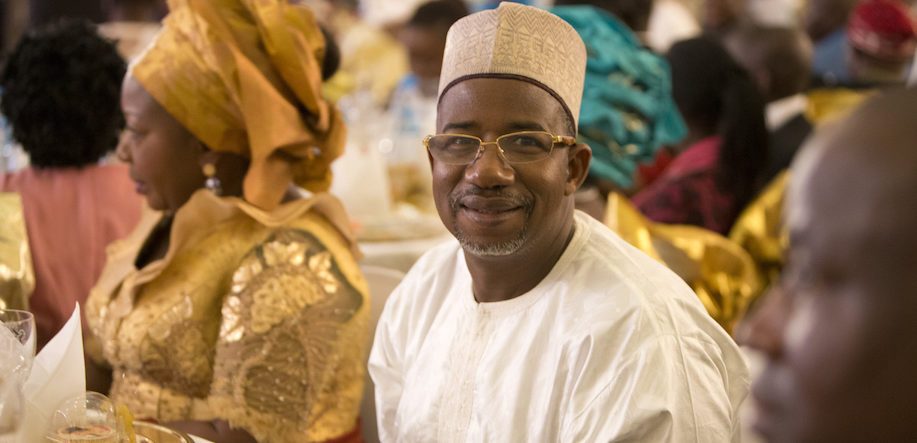Government
Court Admits Former FCT Minister, Bala Mohammed to N500m Bail
Published
8 years agoon

- Court Admits Former FCT Minister, Bala Mohammed to N500m Bail
A High Court of the Federal Capital Territory (FCT) sitting in Gudu district, Abuja on Friday admitted former Minister of the FCT, Senator Bala Mohammed to bail in the sum of N500m and two sureties in like sum.
Justice Abubakar Talba in granting him bail said one of the two sureties must be a senator, while the other, a Federal Director.
In addition, all the sureties must have landed property in the Federal Capital Territory with a Certificate of Occupancy as well as evidence of payment of tax in the last three years.
The judge also ordered that the applicant deposits his international passport with the registrar of the court.
Justice Talba who granted the bail application in his ruling asked both the prosecution and defence counsel to agree on the bail conditions.
This, the judge explained, was to strike a balance in the light of their different positions.
Justice Talba said; ‘It is trite that no matter the gravity of the offences, an accused person is assumed innocence until proven guilty under our laws. Bail is a constitutional right and the purpose is not to set an accused person free but to grant him liberty to enable him attend trial.
“Although the prosecution has urged the court to consider the gravity of the offence as well as issues raised in the counter affidavit. It is my view that such issues will be considered in the hearing of the substantive matter. I am satisfied that the applicant has placed sufficient materials to warrant court to exercise its discretion in his favour.
“Accordingly, his application is hereby granted. However, the terms of conditions for his bail should be negotiated between the prosecution and defence.
This is in order to strike a balance of the case because the prosecution had argued that if the court is mindful to grant bail, it should come with some stringent conditions while on the other hand, the defence counsel urged that the bail should be on self- recognition.”
After stating this, the court stood down for 30 minutes to allow the prosecution and defence counsel to agree on workable bail terms.
Justice Talba on resumption, adopted the bail conditions agreed upon by counsel as the ruling of the court.
He further adjourned trial to July 4, 2017. Bala Mohammed was arraigned on a six- count charge by the Federal government on allegations of receiving gratification when he was minister of the FCT.
He pleaded not guilty to the charges and his lawyer accordingly applied for his bail.
The court however, remanded him in prison custody pending the ruling on his bail application yesterday.
The former Minister who pleaded not guilty to all the charges described his trial as politically motivated.
In moving the bail application, Bala’s counsel, Chief Chris Uche SAN, urged the court to release his client on bail pending his trial.
The bail application was brought under section 35(1) & (4) and 36 (5) and (6) of the 1999 constitution and section 158, 162, 163 & 165 of the Administration of Criminal Justice Act 2015.
Uche, submitted that the alleged offences are bailable, adding that his client had earlier been arrested, detained and investigated by the EFCC in connection with the account of his tenure as minister of the FCT, in respect of unsubstantiated allegations of conspiracy, abuse of office and money laundering, and had been in its custody between October 24, 2016 and December 9, 2016.
He further told the court that a High Court of the FCT had in November 29, 2016 released the former Minister on bail and he was subsequently arraigned before this same court on five count charge, which was later withdrawn by the EFCC.
The defence counsel further submitted that his client had a good defence to the charge as he did not commit any offences charged or whatsoever, and he was prepared to stand trial and offer his defences to the allegations, which he strongly believe were politically motivated.
He disclosed that the former minister had a health condition with a long history of lung collapse and disorder and his health situation deteriorated while in custody of the EFCC.
He averred in his supporting affidavit that any further detention pending trial would worsen the already deteriorated health condition of Bala who is currently under observation of a United Kingdom Hospital.
In opposing the bail, the prosecution counsel, Ikani urged the court to refuse the bail application on the grounds that some of the paragraphs offend the provisions of section 115(1)(2) of the Evidence Act.
He further argued that if granted bail, the defendant may not be available to stand trial since some of the offences attract a prison term of five years.
Ikani further urged the court to refuse the application in view of the prevailing circumstances in the country.
In the alternative, he urged to court to attached stringent conditions to his bail.
In the six count charge filed by Aso Larry Peters, the defendant was alleged to have in 2014 did accept gratification of a house worth N550 million only situate at No 2599 and 2600 Cadastral zone AO4 Asokoro District, Abuja from Aso Savings and Loans Bank Plc as reward for performing his official duties and thereby committed an offence contrary to Section 18(b) of the Independent Corrupt Practices and Other Related Offences Act 2000 and punishable under the section 18(d) of the same act.
In count two, the defendant was alleged to have on October 24, 2016 in the course of filling his Assets Declaration Form at EFCC did knowingly fail to make full disclosure of his property No. 54, Mike Akhigbe Street, Jabi and thereby committed an offence contrary to Section 27(3)(a) of the EFCC Act 2004 and punishable under section 27(3)(c) of the same act.
In count three, Mohammed was alleged to have on October 24, 2016 in the course of filling his Assets Declaration Form at the EFCC office make a false declaration of his property known and situate at Agwan Sarki, Kaduna, Kaduna State as underdeveloped plot of land whereas it is a fully built house and thereby committed an offence contrary to section 27(3)(b) of the EFCC Act, 2004 and punishable under Section 27(3)(c) of the same Act.
In addition, in count four, Mohammed was alleged to have on October 24, 2016 in the course of filling his Assets Declaration Form before the EFCC did knowingly make a false declaration that a house known and situate at CITEC KWARA 5, A9 Street Mbora, Abuja FCT belonging to Abubakar Abdu Mohammed as his own asset and thereby committed an offence contrary to Section 27(3)(b) of the EFCC Act 2004 and punishable under Section 27(3)(c) of the same Act.
In count five, Mohammed was alleged to have on October 24, 2016 made a false statement to Detective Ishaya Dauda investigating officer with Economic Governance section of the EFCC Abuja to wit: that you acquired house situate at No. 2599 and 2600 Cadastral Zone AO4 Asokoro District, Abuja through mortgage facility from Aso Savings and Loan Bank, Plc and thereby committed an offence contrary to Section 39(2)(a) of the EFCC Act 2004 and punishable under Section 39(2)(b) of the same Act.
In count six, Mohammed was alleged to have while being the minister of the FCT and Chairman, Board of Directors of Aso Savings and Loans Bank, plc use his office and position to confer corrupt and undue advantage upon his Associates by allocating four numbers fully detached duplexes and 11 numbers semi-detached duplexes valued at N314 million only through the Presidential Task force on sale of Government Houses to them and thereby committed an offence punishable under Section 19 of the Independent Corrupt Practices and Other Related Offences Commission Act 2000.
Is the CEO and Founder of Investors King Limited. He is a seasoned foreign exchange research analyst and a published author on Yahoo Finance, Business Insider, Nasdaq, Entrepreneur.com, Investorplace, and other prominent platforms. With over two decades of experience in global financial markets, Olukoya is well-recognized in the industry.

You may like
-
70 Million Poorest of The Poor Nigerians To Get N75,000 From FG
-
Nigeria Surpasses OPEC Quota with 1.51 Million bpd, Targets 2.06 Million in 2025
-
Global Investors Commit $7.6 Billion to Nigeria’s Development at AIF 2024
-
Nigeria-China Trade Strengthened as Grimaldi Introduces Direct Shipping Line
-
Nigeria’s GDP Records 3.46% Growth in Q3 Spurred by Non-Oil Sector
-
President Tinubu Presents N47.9trn 2025 Budget As Debt Servicing, Security, Infrastructure Take Lion Shares













